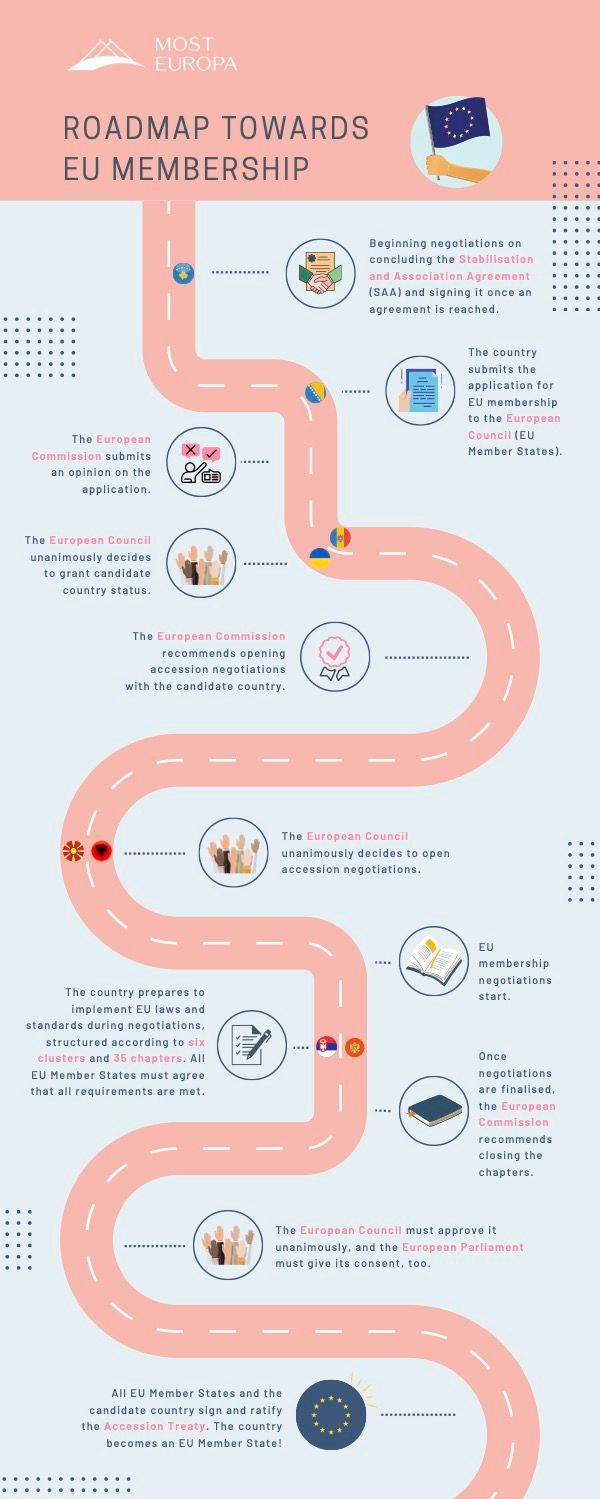EU agrees to start accession talks with North Macedonia and Albania: Next Steps
North Macedonia and Albania can finally start accession negotiations with the EU. But the road will still be long and rocky for North Macedonia, which had to make political compromises throughout the process like hardly any other country. What are the next steps?
Probably no other country in the history of the EU has had to overcome these many obstacles and fulfil such drastic requirements to be allowed to start EU accession negotiations as North Macedonia.
On Monday, 18.07.2022, North Macedonia and Albania finally received the green light to start EU accession talks that could ultimately lead to EU membership. However, this happy news leaves a strange aftertaste. The approaching opening of accession negotiations, at least for North Macedonia, is marked by a history of vetoes and questionable decisions on the part of the EU.
North Macedonia has had candidate status since 2005 but could not start accession negotiations for 17 years.
Because of Greece's opposition, the country changed its name and flag and gave up the "Hellenisation" of its history under the Prespa agreement of 2018.
After Prespa, France blocked the opening of accession negotiations with both Skopje and Tirana until a new methodology for future enlargement was agreed upon at the EU level.
Then, in 2020, Bulgaria vetoed opening negotiations and blocked any progress due to a dispute between the countries over historical issues.
To resolve also this dispute, North Macedonia will have to change its constitution to acknowledge Bulgarians among the nation-building peoples and include them as a minority to finally start accession negotiations.
However, Bulgaria is not backing down on its position on the official language of North Macedonia. It will issue a unilateral declaration that it does not recognise the Macedonian language, while the other 26 EU members do.
It is still unclear whether the required two-thirds majority in parliament needed to change the constitution will be achieved. The nationalist opposition has already announced that it will not vote for the constitutional amendment.
What comes next?
Before accession negotiations can start, the European Council must unanimously decide to open accession negotiations. In the process, the European Commission must be satisfied that the candidate country meets three conditions, the so-called Copenhagen criteria:
political criteria: stability of institutions guaranteeing democracy, the rule of law, human rights and respect for and protection of minorities;
economic criteria: a functioning market economy and the capacity to cope with competition and market forces;
Administrative and institutional capacity to implement the acquis divided into 35 chapters and grouped into six clusters
Negotiations take place between ministers and ambassadors of the EU governments and the candidate country in an Intergovernmental Conference (IGC). The first phase entails a rigorous screening process of the candidate country's legislation to see how well aligned it is with EU law or the acquis communautaire.
The acquis is divided into 35 negotiating chapters, grouped into six clusters, covering every legislative aspect, which all individually only can be closed with the unanimous blessing of all EU member states.
Negotiations begin with the chapters on so-called 'fundamentals', issues like the judiciary and fundamental rights, and this chapter is also the last to be signed off. Negotiations of several chapters can take place simultaneously.
Once all chapters have been closed, the Commission recommends candidate countries for membership. The country signs the Accession Treaty that specifies a date for accession, making it an 'acceding country'.
The treaty must be ratified by all 27 member states and the European Parliament, which must approve the text with an absolute majority.
There are still many stumbling stones on North Macedonia's way to becoming an EU member, and it will realistically take the country many years to get there.
